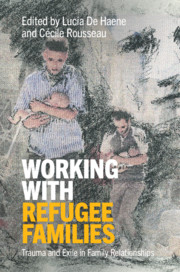Book contents
- Working with Refugee Families
- Working with Refugee Families
- Copyright page
- Dedication
- Contents
- Contributors
- Foreword
- Acknowledgments
- Introduction
- Part I Refugee Family Relationships
- Part II Trauma Care for Refugee Families
- Chapter 7 Mobilizing Resources in Multifamily Groups
- Chapter 8 Working through Trauma and Restoring Security in Refugee Parent-Child Relationships
- Chapter 9 Trauma Narration in Family Therapy with Refugees
- Chapter 10 Exile and Belonging
- Chapter 11 Working with Spirituality in Refugee Care
- Chapter 12 Collaborating with Refugee Families on Dynamics of Intra-family Violence
- Chapter 13 Supporting Refugee Family Reunification in Exile
- Chapter 14 Diagnosis as Advocacy
- Chapter 15 Reflexivity in the Everyday Lives and Work of Refugees and Therapists
- Part III Intersectoral Psychosocial Interventions in Working with Refugee Families
- Conclusion
- Index
- References
Chapter 8 - Working through Trauma and Restoring Security in Refugee Parent-Child Relationships
from Part II - Trauma Care for Refugee Families
Published online by Cambridge University Press: 21 August 2020
- Working with Refugee Families
- Working with Refugee Families
- Copyright page
- Dedication
- Contents
- Contributors
- Foreword
- Acknowledgments
- Introduction
- Part I Refugee Family Relationships
- Part II Trauma Care for Refugee Families
- Chapter 7 Mobilizing Resources in Multifamily Groups
- Chapter 8 Working through Trauma and Restoring Security in Refugee Parent-Child Relationships
- Chapter 9 Trauma Narration in Family Therapy with Refugees
- Chapter 10 Exile and Belonging
- Chapter 11 Working with Spirituality in Refugee Care
- Chapter 12 Collaborating with Refugee Families on Dynamics of Intra-family Violence
- Chapter 13 Supporting Refugee Family Reunification in Exile
- Chapter 14 Diagnosis as Advocacy
- Chapter 15 Reflexivity in the Everyday Lives and Work of Refugees and Therapists
- Part III Intersectoral Psychosocial Interventions in Working with Refugee Families
- Conclusion
- Index
- References
Summary
"The migration process is impeded by different challenges. Refugees must deal with their own traumatic experiences, which are intimate and personal but also relate to collective trauma that can destroy a sense of belonging to a community and weaken shared values. In addition to multiple traumas experienced in their country, refugees face the trauma of migration itself and the dramatic events that occur during migration. We argue that every migration process constitutes a traumatic experience marked by a rupture with the country of origin, by the modification of relational links, and by difficulties in cultural identification. In these situations, the parent-child relationship might be severely compromised. Children in migration are exposed to a particular vulnerability described by the concept of “exposed child”. We address the sequelae of the disruption of cultural meaning systems and cultural belonging invoked by collective violence and by migration itself, focusing on a specific therapeutic device for families. We illustrate the theoretical elaboration of this device with a clinical vignette."
Keywords
- Type
- Chapter
- Information
- Working with Refugee FamiliesTrauma and Exile in Family Relationships, pp. 132 - 147Publisher: Cambridge University PressPrint publication year: 2020



